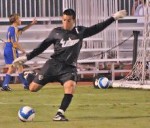Goalkeeper has overcome all obstacles

One of the key components to the early success of this year’s men’s soccer team has been the effort provided by goalkeeper Diego Restrepo.
The sophomore may be riding high now, but the road has been a difficult one.
Growing up in Colombia, soccer was something Restrepo was regularly exposed to. He didn’t begin playing the game, however, until he moved to the United States at age 13. His family’s decision to come to America was necessary because of the hardships of life there.
“When I was a kid in Colombia, my parents had a real estate company,” Restrepo said. “At that time, kidnapping was a major problem. Because people thought my family had a little bit of money, me and my brother became targets in our hometown of Cali.”
In 2002, the BBC reported that an estimated 3,000 people a year are kidnapped in Colombia, which accounts for about half of the world’s kidnappings every year. Restrepo’s hometown of Cali is known for criminal activity because of the drug cartel that operates within the city. Leftist guerrilla groups that use the ransom money to fund their operations conduct about 55 percent of the kidnappings, according to CNN.com.
With his family forced to take safety precautions, the Restrepo brothers’ activities were severely limited. Other than his trips to school, Restrepo was bound to his family’s apartment.
“It was difficult being a kid and not being able to go to the park and play with other kids,” Restrepo said. “It was a big decision, but we just decided that we wanted a better life, so we came here.”
The transition to life in America allowed Restrepo freedoms he had previously been denied. Soccer was now something he could play regularly, and he did. He began playing club soccer at the youth level in West Palm Beach, revealing a natural talent for the sport. Another transition awaited Restrepo, though, but this time it was on the field.
“I used to be a field player,” Restrepo said. “Then one day my team’s goalkeeper got hurt during a game and we needed someone to step in, so I did. I did really well and ever since that day, I’ve been in goal.”
When it came time to choose a school, Restrepo chose USF over several other programs.
“I was leaning towards other programs like Maryland and actually committed to University of California Santa Clara,” Restrepo said. “But when I came here and met the people and coaches, I knew this would be a great place for me to grow as a player and hopefully get to the next level.”
It’s only his second season with the team, but people wouldn’t know it by watching him. A goalkeeper has to be a leader, as well as the last line of defense. Many free kicks are deflected off of the wall he organizes. He watches over the defensive line and communicates important information about the opposing team’s attack. In a nutshell, he’s one of the most important players on the field.
USF coaches have been impressed with Restrepo’s ability to fill the hole left by former letter-winning keeper Dane Brenner, who provided leadership to the team during his senior season last year.
“Diego transitioned into (replacing Brenner) well,” Kiefer said. “Diego is a good leader. We work with him constantly on how to get the most out of the team playing in front of him. A good goalkeeper is like good quarterback. If they take care of the guys that are protecting him, then he usually has a good game.”
The USF coaching staff sees other positives to having Restrepo in the goal, aside from his talent. The goalkeeper has a fiery personality that often pushes his teammates to work even harder.
“Diego’s a guy that, when he’s playing, gets very fired up and he likes to wind other players up,” Kiefer said.
The hard work is paying off for Restrepo this season. In the team’s first seven matches he has three shutouts and has played all 90 minutes of each contest. He earned a Big East honorable mention for his pair of shutouts earlier this year at the UConn/adidas classic in Connecticut.





